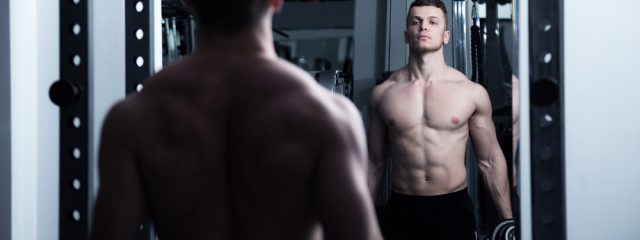MALE BODY IMAGE | THE VARIOUS GUISES OF MALE BODY IMAGE

It is known that distorted body image is more common in females than males. Although men do experience negative body image throughout their lives, positive and healthy body image is often discussed when talking about female body image. Nevertheless, data shows that one in three people struggling with negative body image, eating disorders and disordered eating behaviours are men.
The perception you have of your physical self, and the thoughts and emotions that result from this perception is known as body image. However, it is crucial to acknowledge that how you experience your body might not always reflect reality. A distorted perception of your own body can manifest as body image distortions, which might result to eating disorders.
Male Body Image and Vulnerabilities
Similarly to women, men often feel a social pressure to achieve an ideal body type. Normally, this pressure increases with age and the difference between a male’s ideal and his body increases as well.
Generally, men are socialised to not talk and discuss about their body image issues.
Research shows that males suffering from eating disorders often experience depression and shame. Because of cultural bias, men are often encouraged and expected to hide their “vulnerabilities” which are often characterised as feminine. The stigma of eating disorders in men may lead to the underreporting of symptoms which prevents diagnosis and treatment, but also research in this area for advancement.
It is therefore crucial that we, as a society, promote an accepted culture and safe environment that will allow men to show their vulnerabilities.
Muscle dysmorphia
Men just like women can have obsessive thoughts with particular body parts. These thoughts are often negative and relate to unrealistic physical defects on their bodies, a condition recognised as body dysmorphic disorder. Similarly to eating disorders, body dysmorphic disorder involves body image concerns.
Individuals suffering from muscle dysmorphia can have obsessive thoughts about not being adequately muscular or lean, when this might not be the case. A study shows that there is large association between male body dissatisfaction and diet, body fat and muscle size.
Why do males develop a negative body image?
The idea of masculinity is often associated with unrealistic bodies observed on social media and/or media. Research shows that in recent years, the rise of social media has contributed in reinforcing messaging associated to people’s body.
Social media
Social media can have an impact on your body image and relationship to food due to the exposure to thin and toned body types. Studies show that 88% of women compare themselves to images they observe on social media, with over half of them emphasising that the comparison is unfavourable. Whereas, 65% of men compare themselves to images on social media with 37% indicating that the comparison is unfavourable. This is extremely problematic as this can lead to negative body image, lower self-esteem, unbalanced diet, deficiencies of vitamins and minerals and possibly eating disorders
Social comparisons-and pressures
Due to the nature of social media, it allows you to feel like you have a personal connection to the people you follow. The accounts you follow might share particular content such as muscular/toned bodies and overemphasise the consumption of healthy food. This selected exposure makes it easier to be negatively influenced and might lead you to believe that particular body types are more common and natural than what it actually is.
Certain body types such as muscular and lean bodies are prioritised as ideal body types for males for that reason the society may perceive these body types, or to be more attractive and healthier than other ones. Social media allows their users to like content posted by others. Generally, muscular and lean body types receive more likes and this contributes in promoting muscular and lean male bodies to be perceived as more attractive. These social norms may impact how you view your body because humans have a general need to gain approval of others and avoid their disproval, as a result you might conform to the social norms related to appearance.
WHAT CAN YOU DO to improve your body image?
Social media can often negatively influence your self-esteem, body image, and relationship with food. A negative body image can lead to different mental-and physical health issues, but also impact how you feel about yourself overall.
You can try to unfollow accounts that have a negative impact on your body image and mental health. However, if you think you are struggling with mental health issues and low confidence, our WeightMatters team is here to help you.
Body Image Treatment
Learn more about Body Image
Here are some articles and blogs about body image


